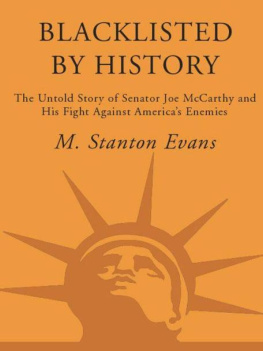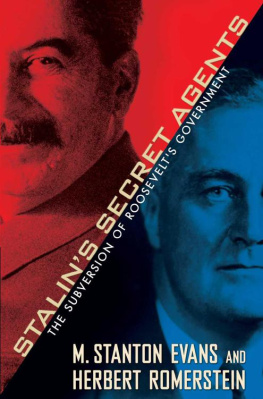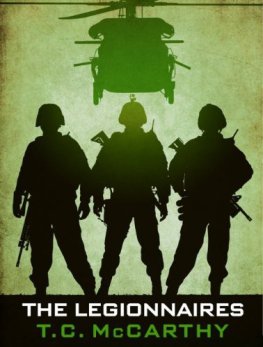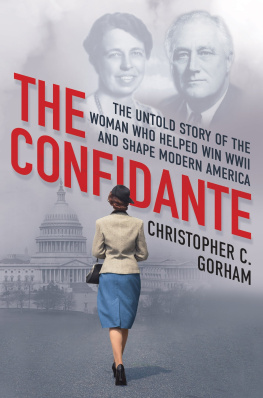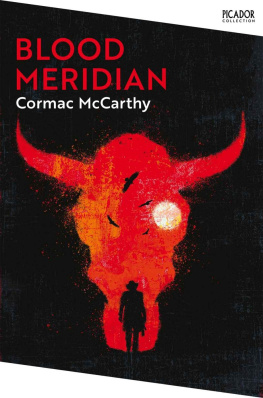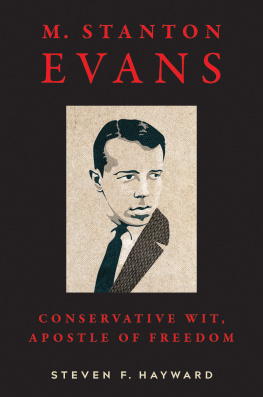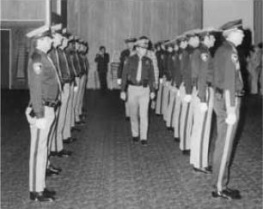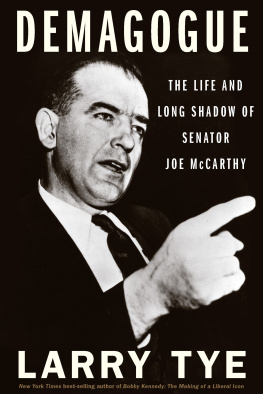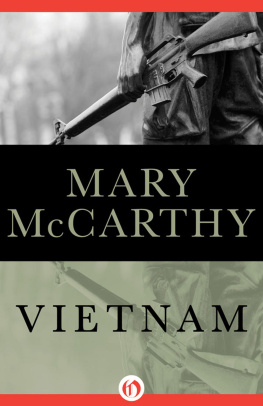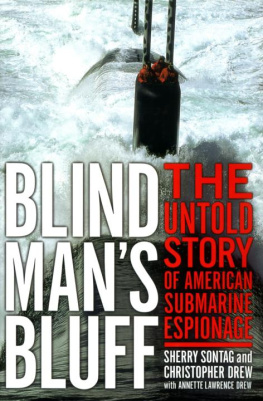M. Stanton Evans - Blacklisted by History: The Untold Story of Senator Joe McCarthy and His Fight Against Americas Enemies
Here you can read online M. Stanton Evans - Blacklisted by History: The Untold Story of Senator Joe McCarthy and His Fight Against Americas Enemies full text of the book (entire story) in english for free. Download pdf and epub, get meaning, cover and reviews about this ebook. year: 2007, publisher: Crown Forum, genre: History. Description of the work, (preface) as well as reviews are available. Best literature library LitArk.com created for fans of good reading and offers a wide selection of genres:
Romance novel
Science fiction
Adventure
Detective
Science
History
Home and family
Prose
Art
Politics
Computer
Non-fiction
Religion
Business
Children
Humor
Choose a favorite category and find really read worthwhile books. Enjoy immersion in the world of imagination, feel the emotions of the characters or learn something new for yourself, make an fascinating discovery.
- Book:Blacklisted by History: The Untold Story of Senator Joe McCarthy and His Fight Against Americas Enemies
- Author:
- Publisher:Crown Forum
- Genre:
- Year:2007
- Rating:3 / 5
- Favourites:Add to favourites
- Your mark:
- 60
- 1
- 2
- 3
- 4
- 5
Blacklisted by History: The Untold Story of Senator Joe McCarthy and His Fight Against Americas Enemies: summary, description and annotation
We offer to read an annotation, description, summary or preface (depends on what the author of the book "Blacklisted by History: The Untold Story of Senator Joe McCarthy and His Fight Against Americas Enemies" wrote himself). If you haven't found the necessary information about the book — write in the comments, we will try to find it.
M. Stanton Evans: author's other books
Who wrote Blacklisted by History: The Untold Story of Senator Joe McCarthy and His Fight Against Americas Enemies? Find out the surname, the name of the author of the book and a list of all author's works by series.
Blacklisted by History: The Untold Story of Senator Joe McCarthy and His Fight Against Americas Enemies — read online for free the complete book (whole text) full work
Below is the text of the book, divided by pages. System saving the place of the last page read, allows you to conveniently read the book "Blacklisted by History: The Untold Story of Senator Joe McCarthy and His Fight Against Americas Enemies" online for free, without having to search again every time where you left off. Put a bookmark, and you can go to the page where you finished reading at any time.
Font size:
Interval:
Bookmark:


CONTENTS
For my mother
JOSEPHINE STANTON EVANS
who knew it all along
and for
TIERNEY M C CARTHY
wherever she may be

PROLOGUE
The Search for Joe McCarthy
I N THE peacetime summer of 1946, the first such summer in half a decade, a State Department official named Samuel Klaus drafted a long confidential memo about the grave security problems that were plaguing the department.
This 106-page report, dated August 3, contained some startling revelations. It discussed, among other things, the number of Soviet agents said to be on the payroll at State, alleged Communist Party members there, and others in the department described as suspects or sympathizers. In the cases of agents and CP memberssome thirty-three people altogetherthe names (one being Alger Hiss) had been compiled by States security screeners. As for the suspects and sympathizers, numbering more than ninety staffers, the names werent available yet as lists were still being assembled.1
Information of this type, needless to say, was both ultrasecret and of sensational nature. During the crisis of World War II, when the Soviet Union was our ally against the Nazis, comparatively little attention had been paid to the matter of Communists in the federal workforce. But in the early postwar era, the alliance with Moscow had rapidly unraveled and was being replaced with a series of hostile confrontations that would be dubbed the Cold War. The presence of CP members or fellow travelers in official jobs, formerly viewed with indulgence or ignored, would look shockingly different in 1946 when Sam Klaus composed his memo.
Some four years later, at the height of the loyalty/security furor then raging around the State Department, Sen. Joe McCarthy (R-Wis.) learned about this memo and stirred up a major flap about it. Thanks to the McCarthy pressure, a Senate subcommittee chaired by Sen. Millard Tydings (D-Md.) requested a copy from the department and in due course received one. Thus, one of the most revealing documents ever put together about Red infiltration of the U.S. government was supplied to Congress. But thereafter, so far as the public record shows, the Klaus memo would mysteriously vanish.
In the National Archives of the United States there are at least two places where this report should be on offer. One is the legislative archive of the Tydings panel, which was weighing McCarthys charges of State Department security breakdown and which unquestionably got a copy. This is reflected in the departments letter of transmittal, which survives and is included in the subcommittee records. So the memo should also be in the files, but isnt.
The other place where this memo ought to be is in the papers of Sam Klaus, held in another section of the Archives. In the index to the Klaus papers, the document is listed, under its proper official heading. However, when the file was examined by this writer it turned out the report again was missing. In this case, at least, we know what happened to it. The file contained a notice where the memo had been, saying it was withdrawn from the Archives in March 1993not quite half a century after it was written. So this important document is twice over absent from the nations official records.
Unfortunately for researchers of such matters, this elusive memo is but one of many Cold War papers that have gone AWOL. Some two dozen other documents from the State Department relating to security issues were likewise supplied to Tydings and should be in the Archives also. In these cases handsomely embossed cover sheets, signed by Dean Acheson, Secretary of State in 1950, are still there in the folders. In every case as well, however, the material once enclosed has been stripped from the cover sheet, leaving small wads of paper beneath the staples that held the documents together.
Other historical data that ought to be in the subcommittee records are documents provided to the panel by McCarthy. These included a McCarthy-to-Tydings letter of March 18, 1950, listing the names of eighty loyalty/security suspects at State and elsewhere, some of whose anonymous cases McCarthy had earlier recited to the Senate. Enclosed with the McCarthy list was a letter from the head of the Central Intelligence Agency concerning one of the eighty suspects. In addition, McCarthy that same week gave Tydings a list of two dozen other names as potential subjects of inquiry. All told, a pretty sizable package of information on the most burning issue of that day, and many days thereafter.
As these papers were part of an official proceeding of the Senateand as we know from other sources they were in fact providedthey should all be in the Tydings archive. Again, however, so far as diligent search reveals, all of them are missing, with no explanation of what happened to them, no hint that they were ever there, and no withdrawal notice. They are simply gone. Since they were documents central to any assessment of McCarthys charges, their absence is a critical gap in the archival record. That absence, it bears noting, affects more than our understanding of Joe McCarthy. It affects our knowledge of the issue he was addressing, and thus our comprehension of the Cold War era.
Such problems with McCarthy cases didnt cease with Millard Tydings but would occur also with the records of McCarthys own committee, when he became himself the chairman of a Senate panel three years later. Its evident that a lot of records here are likewise missing. A notable instance involves the case of Annie Lee Moss, a security suspect in the Army who appeared before McCarthy at an historic committee session. In the hearing record, reference is made to an Exhibit 18, an FBI report about Mrs. Moss that was obviously important in gauging the merits of the case and what McCarthy had to say about it. But there is no Exhibit 18 to be found in the archive of the McCarthy panel pertaining to the Moss case.2
Nor are such troubles confined to official sources. They extend to private-sector data that should in theory be open to researchers. A significant case in point concerns the famous speech McCarthy delivered in February 1950 at Wheeling, West Virginia, kicking off the whole McCarthy epoch. As is well known, what McCarthy said in this speech became a hotly controverted issue. Much of the dispute revolved around a story in the local morning paper, the Wheeling Intelligencer, saying McCarthy claimed to have a list of 205 Communists working at the State Department. This quote appears in every book we have about McCarthy and many histories of the Cold War. McCarthy would, however, deny he said it, and whether he actually did so would become, and remain, the cause of vast confusion.3
The task of researching the Wheeling speech, and sifting collateral data on it, prompted the thought that, while all discussions of the subject fixate on this one story, there may have been other items in the local paper about such a major event in the life of Wheeling. And if so, these accounts might shed some light on what McCarthy did or didnt say there. This hunch, as it turned out, was correct. However, a trip to Wheeling would reveal that these documents, too, were missing.
For one thing, the Intelligencer no longer had a morgue of stories from the 1950s. Instead, back issues of the paper were now on microfilm at the Wheeling public library. This seemed fair enough, and as the library was only a couple of blocks away, not an overwhelming problem. However, a visit there produced another disappointment. All issues of the paper, dating to the nineteenth century, were microfilmed and apparently in their appointed placesexcept the issues that were in question. Conspicuously absent were editions for January and February 1950the sequence jumping, without explanation, from December 1949 to March 1950. Written inquiry to the librarian produced no reply as to what had happened to these records.
Font size:
Interval:
Bookmark:
Similar books «Blacklisted by History: The Untold Story of Senator Joe McCarthy and His Fight Against Americas Enemies»
Look at similar books to Blacklisted by History: The Untold Story of Senator Joe McCarthy and His Fight Against Americas Enemies. We have selected literature similar in name and meaning in the hope of providing readers with more options to find new, interesting, not yet read works.
Discussion, reviews of the book Blacklisted by History: The Untold Story of Senator Joe McCarthy and His Fight Against Americas Enemies and just readers' own opinions. Leave your comments, write what you think about the work, its meaning or the main characters. Specify what exactly you liked and what you didn't like, and why you think so.

